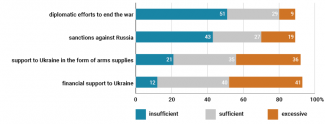An attempt to break the deadlock. Scholz visits Washington
During his working visit to Washington on 8–9 February, Chancellor Olaf Scholz met President Joe Biden, Republican and Democratic Party senators, as well as representatives of US companies (including Mastercard, Pfizer and Excelerate Energy). Scholz was not accompanied by a delegation of German business.
In a press statement ahead of the talks, Biden thanked Germany for its leadership in supporting Ukraine and for increasing its funding of military assistance for Kyiv (see ‘Germany boosts its funding for military support to Ukraine’). Scholz, for his part, emphasised the European Union’s decision to provide another tranche of financial support to Ukraine, and expressed his hope that the US Congress will arrive at an agreement as regards another assistance package, without which Kyiv “will have not a chance to defend its own country”.
Other topics discussed during the meeting included the 75th NATO summit in Washington planned for July, actions to boost NATO’s defence capabilities, and the conflict in the Middle East. The politicians highlighted Israel’s right to defend itself in line with international law as well as the need to increase humanitarian assistance to the Gaza Strip, and expressed their support for a two-state solution as a precondition for lasting peace. It is believed that the two leaders talked for around two hours without the presence of advisors.
Commentary
- Scholz’s visit coincided with a critical moment of difficult discussions in the US Congress concerning whether to adopt an assistance package of military aid for Kyiv. It is difficult to predict the result of these debates. Meanwhile, during the recent European Council summit EU leaders failed to decide on what military assistance the bloc would continue to provide Kyiv (see ‘The EU approves financial assistance for Ukraine and negotiates military assistance’). From Germany’s point of view, the meetings in Washington were intended to support Biden’s policy and convince Congress, in particular its Republican part, to approve assistance for Kyiv. Berlin also wanted to communicate to its partners in the US and Europe that although it has been meeting its obligations, it will not be able to allocate further significant funds to Ukraine in order to fill any gap resulting from the absence of US assistance.
- Scholz’s visit was accompanied by the publication of his article in the Wall Street Journal, in which he emphasised that there is no alternative to Western support for Ukraine and outlined the consequences of its potential halt. He also stressed that the Russian invasion represents an attack on the US-led liberal international order and thus poses a threat to America’s vital interests. His other intention was to talk in person to US senators, both Republican and Democratic, during a dinner at the residence of Germany’s ambassador to Washington.
- The main purpose of the chancellor’s visit to Washington was to boost Germany’s image as its key ally in the European Union and to support Ukraine in its fight against Russia. Scholz stressed that in 2024 Germany has increased its defence spending to 2% of its GDP (this was possible because the additional funds allocated to military assistance to Kyiv were categorised as defence spending). He also referred to an initiative proposed by Berlin for the creation of a European anti-aircraft and missile defence shield (see ‘Germany’s European Sky Shield Initiative’), and to plans to deploy a German brigade in Lithuania as part of the Bundeswehr’s presence on NATO’s eastern flank (see ‘The German ‘Brigade Lithuania’’). In order to prove Berlin’s credibility as a NATO ally, he cited statistics regarding Germany’s military assistance to Ukraine. In his article for the Wall Street Journal Scholz indicated that the value of the military equipment earmarked, procured and delivered for Kyiv now stands at more than $30 bn – although that number is inconsistent with the figures provided by the German defence ministry. According to the ministry, since 24 February 2022 Germany has spent €5.66 bn on military assistance and provided €10.5 bn as available commitment appropriations for military support to Ukraine in the budget years post-2024, which makes a total of around €17 bn (around $18.3 bn).
- Emphasising Germany’s huge involvement is also intended to provide support to Biden in the US presidential campaign and to present him as the only guarantor of stable transatlantic relations. Berlin is concerned that a victory for Donald Trump could destabilise transatlantic cooperation and undermine the US’s security guarantees to its NATO allies. In addition, Berlin is highlighting the decisions it has taken since 24 February 2022 in the sphere of security, as well as the scale of its assistance to Ukraine. This is intended to serve as an argument to refute the Republican accusations that the European allies have not spent enough on their own defence.
- The ongoing deadlock on providing assistance to Kyiv may jeopardise Germany’s domestic political stability. The decision to increase assistance would most likely require the suspension of the so-called debt brake, and would spark further tensions in the government over the budget. It would also provoke opposition from the public, which mostly supports the brake (56%, according to a poll conducted by Forschungsgruppe Wahlen in February). It could also boost German citizens’ reluctance to provide new funding to Ukraine, as according to a DeutschlandTrend poll conducted in January the majority of respondents believe that the scale of financial and military assistance to Ukraine is too big; this view was supported by 41% and 36% respectively (see Appendix). This was the biggest such share recorded since April 2022. This group may further increase as a result of the campaign ahead of the European Parliament elections in June and the elections to the Landtags in Germany’s eastern federal states planned for autumn. The pro-Russian parties Alternative for Germany (AfD) and the Sahra Wagenknecht Alliance for Reason and Justice (BSW) will likely spread the narrative that Russia poses an increasing threat to Germany due to Berlin assuming the role of Kyiv’s main ally, the uncertainty of US security guarantees following Trump’s potential victory, and repeated appeals to launch peace negotiations with the Kremlin as political fuel during the campaign.
APPENDIX
Chart. Germany’s actions regarding the war in Ukraine as viewed by German respondents

Source: DeutschlandTrend poll, January 2024, infratest-dimap.de.





